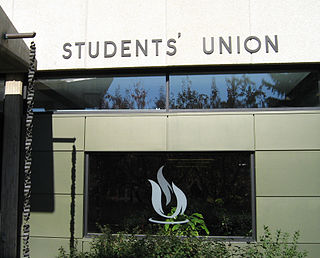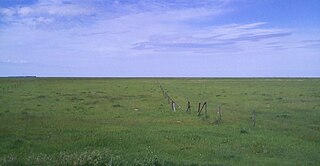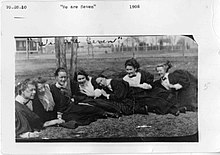
CreeKREE is a dialect continuum of Algonquian languages spoken by approximately 117,000 people across Canada, from the Northwest Territories to Alberta to Labrador. If considered one language, it is the aboriginal language with the highest number of speakers in Canada. The only region where Cree has any official status is in the Northwest Territories, alongside eight other aboriginal languages. There, Cree is spoken mainly in Fort Smith and Hay River.

The University of Alberta is a public research university located in Edmonton, Alberta, Canada. It was founded in 1908 by Alexander Cameron Rutherford, the first premier of Alberta, and Henry Marshall Tory, the university's first president. It was enabled through the Post-secondary Learning Act. The university is considered a "comprehensive academic and research university" (CARU), which means that it offers a range of academic and professional programs that generally lead to undergraduate and graduate level credentials.

Pi Beta Phi (ΠΒΦ), often known simply as Pi Phi, is an international women's fraternity founded at Monmouth College, in Monmouth, Illinois on April 28, 1867 as I. C. Sorosis, the first national secret college society of women to be modeled after the men's Greek-letter fraternity.

The University of Alberta Students' Union (UASU) is the student society that represents undergraduate students at the University of Alberta. Originally established in 1909, it is a non-profit corporation that operates under the authority of the Post-Secondary Learning Act (Alberta). Its membership consists of the roughly 31,000 undergraduate students enrolled at the university.

The province of Alberta, Canada, has a history and prehistory stretching back thousands of years. The ancestors of today's First Nations in Alberta arrived in the area by at least 10,000 BC, according to the Bering land bridge theory. Southerly tribes, the Plain Indians, such as the Blackfoot, Blood, and Peigans eventually adapted to seminomadic plains bison hunting, originally without the aid of horses, but later with horses that Europeans had introduced.
University of Alberta Press is a publishing house and a division of the University of Alberta that engages in academic publishing.

St. Joseph's College is a Catholic, undergraduate, liberal arts college on the University of Alberta campus. It also serves as a residence and place of worship. It is affiliated with the University of Alberta and the Archdiocese of Edmonton, and is pastorally served by the Basilian Fathers. Its courses, residences, and campus ministry services are open to all University of Alberta students, and all of its courses are 3-credit University of Alberta Arts electives.

The University of Alberta Faculty of Law is the graduate school of law of the University of Alberta in Edmonton, Alberta, Canada. Established as an undergraduate faculty in 1912 it is the third oldest law school in Canada, and often considered the oldest law school in Western Canada.

MacEwan University is a public undergraduate university located in the downtown core of Edmonton, Alberta, Canada.

Beaverhill Lake is a large lake in central Alberta, Canada. It is a site of regional importance in the Western Hemisphere Shorebird Reserve Network. It is managed by the Canadian Wildlife Service division of Environment Canada.
A colony is a probationary body of a national fraternity or sorority. It can be considered a new Greek organization that is awaiting official recognition from their international headquarters to maintain a chapter on their college’s campus. A group wishing to become a member of a fraternity or sorority must first petition for status as a colony. The entire membership of the colony remains as uninitiated associates, usually learning and operating under the guidance of an advisor from the national organization and/or from a sponsoring chapter.
The Augustana Campus is a faculty of the University of Alberta located in Camrose, Alberta, Canada. It was merged into the larger, Edmonton, Alberta-based University in 2004.
The North American fraternity and sorority system began with students who wanted to meet secretly, usually for discussions and debates not thought appropriate by the faculty of their schools. Today they are used as social, professional, and honorary groups that promote varied combinations of community service, leadership, and academic achievement.

A fraternity or fraternal organization is an organization, society, club or fraternal order traditionally of men associated together for various religious or secular aims. Fraternity in the Western concept developed in the Christian context, notably with the religious orders in the Catholic Church during the Middle Ages. The concept was eventually further extended with medieval confraternities and guilds. In the early modern era, these were followed by fraternal orders such as Freemasons and Odd Fellows, along with gentlemen's clubs, student fraternities, and fraternal service organizations. Members are occasionally referred to as a brother or – usually in a religious context – frater or friar.

Trianon sorority was a national collegiate organization that operated in the United States from December 1929 to 1977.
The following is a bibliography of Alberta history.

Lambda Delta Sigma (ΛΔΣ) is the only remaining Greek society at Concordia College. Founded in 1919 as a literary society, the ladies of Lambda Delta Sigma have since shifted to a philanthropic organization with their main charity being the YWCA of Fargo. The society operates under their original motto: "Enter to Learn, Depart to Serve".
The University of Alberta Library is the library system of the University of Alberta.

Lana Whiskeyjack is a multidisciplinary artist, writer and researcher known for her work exploring experiences of Cree identity in Western culture. She is featured in the documentary film Lana Gets Her Talk by Beth Wishart MacKenzie.

Bruce Peel Special Collections is a library in the University of Alberta Library system that includes more than 100,000 rare books and archival materials. The library is named for Bruce Braden Peel, chief librarian at the University of Alberta from 1955 to 1982.

















